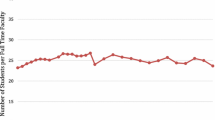Abstract
A type of administrative lie (involving department chairs evaluating faculty) is illustrated. After arguing that the model cases are not “white lies” an ethical justification is sought for the practice. Consequentialism, though often assumed by administrators, does not provide a persuasive justification. The resources internal to the chair’s role as a professional are examined and also found to provide insufficient justification. Finally, it is argued that the chair’s role as a teacher and proponent of liberal education is inconsistent with chairs lying to faculty.
Access this chapter
Tax calculation will be finalised at checkout
Purchases are for personal use only
Similar content being viewed by others
Notes
- 1.
Sissela Bok, Lying (New York: Vintage Books, 1989).
- 2.
Some chairs may be open to this line of argument given their practice as teachers. An instructor may be concerned that if students are really told the truth about the quality of their work, they will become demoralized and perform ever poorer. This concern is plausibly one cause of grade inflation. See Paul Eisenberg, “The Truth, the Whole Truth and Nothing but the Truth,” in Moral Responsibility and the University: Studies in Academic Ethics, ed. Stephen Cahn (Philadelphia: Temple University Press, 1990).
- 3.
Joseph Collins, “Should Doctors Tell the Truth?” in Bioethics, ed. Helga Kuhse and Peter Singer (Oxford: Blackwell, 1999), 501.
- 4.
Collins, “Should Doctors Tell the Truth?” 502.
- 5.
Ernest Greenwood, “Attributes of a Profession,” in Ethical Issues in Engineering, ed. Deborah G. Johnson (Upper Saddle River, New Jersey: Prentice Hall, 1991) 68–69.
- 6.
For additional accounts of a profession see Michael D. Bayles, “The Professions” and Everett C. Hughes, “Professions,” in Ethical Issues in Professional Life, ed. Joan C. Callahan (Oxford: Oxford University Press, 988).
- 7.
Ernest Greenwood, “Attributes of a Profession,” 70.
- 8.
Sometimes the obligation to society pulls in a different direction than serving the client. Sometimes it even overrides serving the client. Consider the public health consequences of the over use of antibiotics. Despite the patient’s desire to be given an antibiotic prior to the determination of the exact organism causing the infection, the physician may refuse not because it would harm the patient, but because of the contribution of unneeded antibiotics to the diminution of their efficacy.
- 9.
Even though departmental administration is not a profession, chairs, in virtue of their role, have moral responsibilities. For example, chairs must foster the educational welfare of students. Evaluating faculty honestly is a plausible adjunct to this end. But here again, the “demoralization account” raises its head. Perhaps the best way to encourage good instruction is to not be truthful about the instructor’s performance.
- 10.
Kenneth Strike, “The Authority of Ideas and the Students’ Right to Autonomy,” in A Professor’s Duties, d. Peter J. Markie (London: Roman & Littlefield, 1994) 103.
- 11.
The writing of this paper has been greatly helped by comments on a draft by Dr. Brian Schrag.
Author information
Authors and Affiliations
Editor information
Editors and Affiliations
Rights and permissions
Copyright information
© 2009 Springer Science+Business Media B.V.
About this chapter
Cite this chapter
Kline, D. (2009). On Telling Faculty the Truth. In: Englehardt, E.E., Pritchard, M.S., Romesburg, K.D., Schrag, B.E. (eds) The Ethical Challenges of Academic Administration. Springer, Dordrecht. https://doi.org/10.1007/978-90-481-2841-9_11
Download citation
DOI: https://doi.org/10.1007/978-90-481-2841-9_11
Published:
Publisher Name: Springer, Dordrecht
Print ISBN: 978-90-481-2840-2
Online ISBN: 978-90-481-2841-9
eBook Packages: Humanities, Social Sciences and LawEducation (R0)



